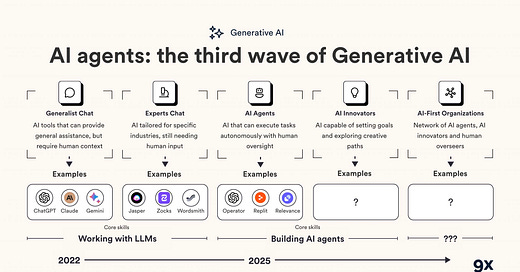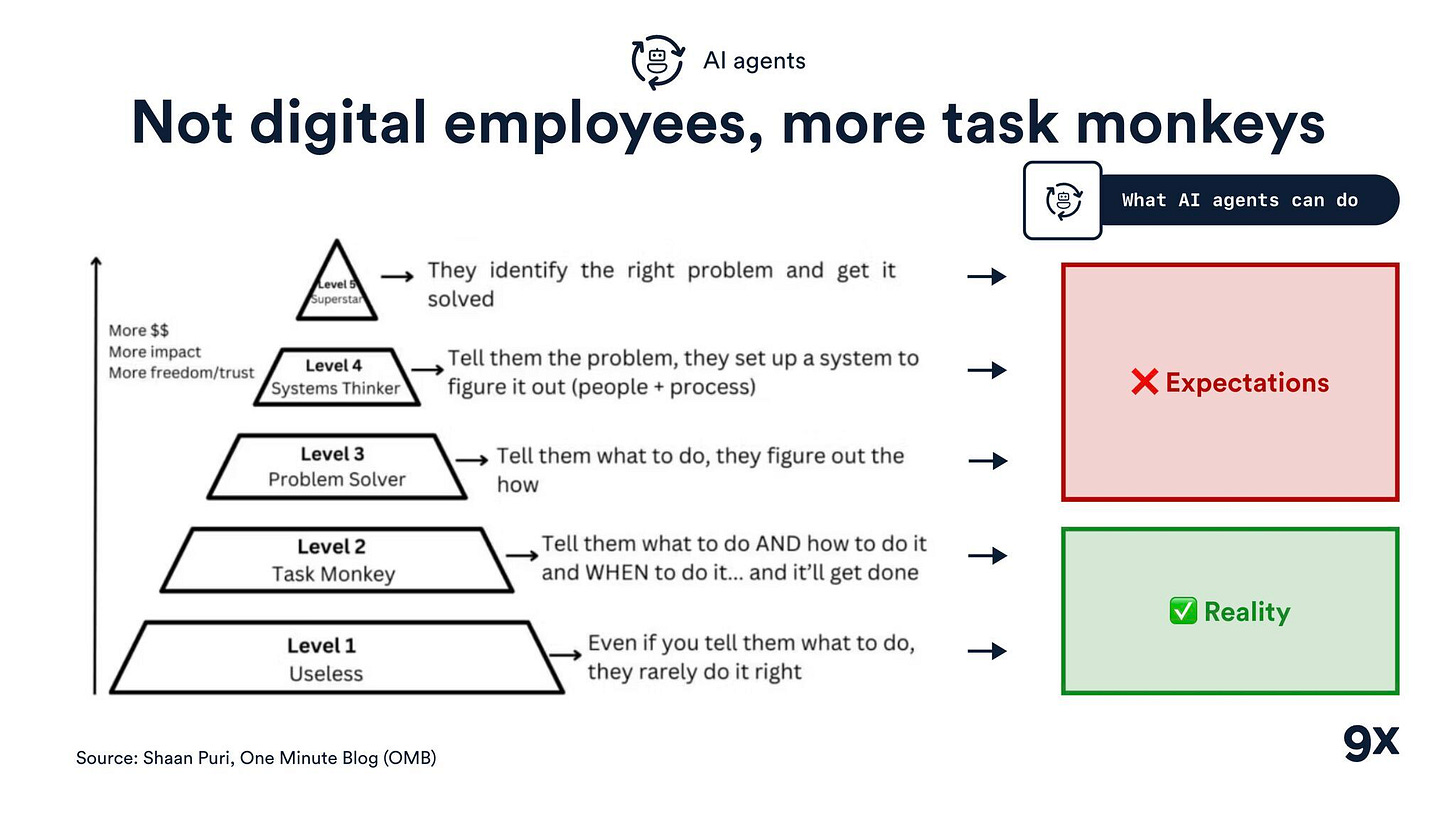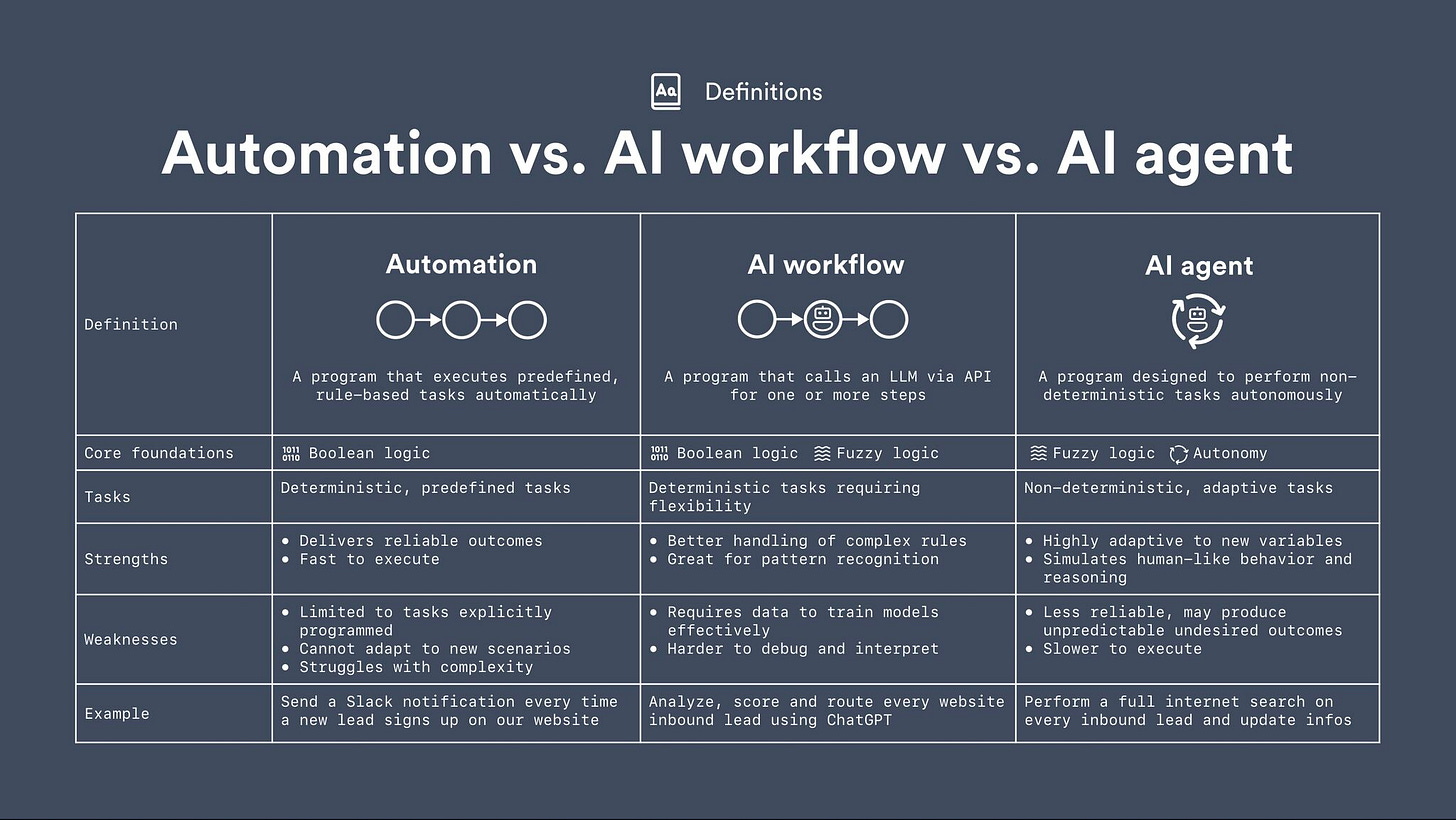Make AI Work is a new newsletter brought to you by Future Work/Life, helping non-technical, AI-curious folks like you understand how AI can help you build great teams and careers. If you find it interesting, please share it!
Everyone’s talking about 2025 as the year of AI agents. But before we start dreaming of digital employees running our businesses, let’s take a breath.
“Even tech startups have not automated most of their processes. And if tech startups haven't automated, imagine what the rest of the economy looks like.”
It's a perspective worth listening to. Alex Kantjas's company, 9x, started as a no-code agency helping businesses automate their processes, but recently pivoted to AI training. Why? Because while everyone's getting excited about AI agents, most businesses haven't mastered the basics yet.
AI agents today are more 'task monkeys' than strategic thinkers
Right now, AI agents are like hyper-efficient assistants. They can take action on their own, but only if given clear, structured instructions. They won’t question bad inputs or think strategically - so expecting them to solve complex problems by themselves? We’re not there yet.
Understanding this is important - because once we know what agents are actually good at, we can use them properly.
So let's break down what makes them special.
What makes an AI agent different?
Alex breaks it down into two key features:
Autonomy: “An agent has a framework that allows it to prompt itself,” he explains. Unlike ChatGPT, where there's always a back-and-forth with the user, an agent can take the next step on its own.
‘Fuzzy logic’: Traditional automation is all about yes/no decisions - if this happens, do that. But AI agents can handle nuance. Want to filter emails that need urgent replies? That's impossible to programme with regular automation (how would you define urgent?), but an agent can interpret what makes something urgent.
How to pick the right tool
This understanding of what makes agents unique helps us make better decisions about when to use them - and more importantly, when not to.
Based on his experience helping businesses automate, Alex identifies three distinct levels, each suited for different challenges:
Regular automation:
Best for: Simple, predictable tasks
Example: Moving invoices between systems
Why it works: Fast, reliable, and often all you need
AI workflows:
Best for: Tasks needing some judgement
Example: Categorising customer feedback
Why it works: Adds flexibility while keeping control
AI agents:
Best for: Tasks needing adaptation
Example: Meeting notes and follow-up
Why it works: Can handle new situations on its own
A real example: Meet Lindy
Want to see what good agent implementation looks like?
Alex's team uses an AI agent called Lindy for their meetings.
“We're using Lindy to record our meetings, take notes. Lindy is programmable. You can ask follow-up questions in the Slack channel. And the agent is going to be thinking about looking at the transcript, looking at the content of the discussion.”
Lindy doesn't just save Alex's team time during meetings - it transforms how they handle information and follow-up. Instead of frantically taking notes or trying to remember key points, everyone can focus on the conversation.
Better still, after the meeting they're not stuck with static notes - they can actually have a conversation with their meeting records, asking questions to clarify points or extract specific information for follow-up tasks
It's a perfect example of both autonomy (it decides what's important) and fuzzy logic (it can understand and respond to questions about the content).
But more importantly, it shows how the right tool, used at the right time, can genuinely improve how we work.
The skills you need
Knowing what's possible is one thing. Actually implementing it is another.
If you want to work with agents effectively - whether now or in the future - Alex sees two key requirements:
Technical understanding: "You're going to need to understand agent frameworks," he explains, "because agents are going to interact with each other." Don't worry - this doesn't mean becoming a programmer. It's more about understanding how these tools connect and work together.
Experimental mindset: "You need to get into the habits of things failing and having an experimental mindset," he says. In his AI training workshops, he sees two types of people: those who get curious when something fails and want to understand why, and those who immediately decide “it's not for me."
What this means for you
Looking at your business today:
What processes follow clear, consistent rules? Start automating these.
Which tasks need more flexibility? Consider AI workflows.
Which tasks need a tool that can figure things out as it goes along? That's where agents might help - eventually.
And remember Alex's key insight - if even tech startups haven't mastered basic automation yet, there's no shame in starting with the basics.
Alex’s LinkedIn is packed with visual explainers that break down AI automation step by step, some of which I’ve shared in this newsletter - check them out and follow Alex here.
In a couple of weeks, I’ll be speaking with Lindy CEO Flo Crivello to dig deeper into how AI agents are shaping the future of work - how they’re actually being used and where the real value is today. Subscribe now so you don’t miss it.
Have a great weekend,
Ollie







